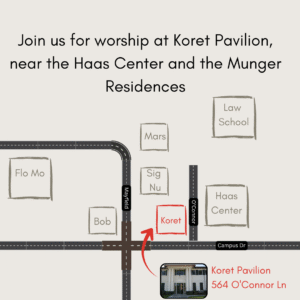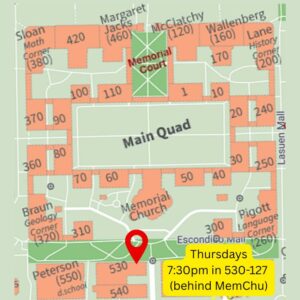Gunnar Dieckmann will be speaking Tuesday, Nov 4 in 300-300 about the relationship between science and Christianity.
Dr. Dieckmann holds a Ph.D. in Chemistry and is also a committed Christian.
He wrote a brief essay titled “A Problem Too Hard for Albert Einstein,” which you may find interesting:
Albert Einstein�s accomplishments rise well above other physicists. So much so that Time Magazine named him, �Man of the Century�. With great foresight he developed a number of outstanding theories in science, including special and general relativity and the explanation of the photoelectric effect, for which he won the Nobel Prize. However, like other great men, he also met his match. In spite of much effort in his later years, he failed to develop a unified field theory combining the forces of gravity with electrodynamics. Less known, but perhaps much more important because it was not only intellectual but also personal, Einstein failed to reconcile the evil he saw and lived-the evil of the Jewish Holocaust-with his strongly held views of a completely determined universe. In his own words:
�Everything is determined . . . by forces over which we have no control. It is determined for the insect as well as for the star. Human beings, vegetables, or cosmic dust-we all dance to a mysterious tune, intoned in the distance by an invisible piper.�(1)
By holding such views, evil, notions of right and wrong, and any punitive consequences fail to exist in a meaningful way. At best we can only talk about a personal subjective good and evil. As Einstein wrote, �In God�s eyes he (man) cannot be responsible (for his actions), any more than an inanimate object is responsible for the motion it undergoes.� (2). Einstein recognized through the order of the universe a God, but only an impersonal one. As he often repeated, �I believe in Spinoza�s God who reveals himself in the harmony of all that exists, but not in a God who concerns himself with the fate and actions of human beings.� (3) Being a Jew and a well-known Zionist he personally encountered much anti-Semitism and when the horrors of the Holocaust were revealed, these became a great challenge to his philosophy. Here is Einstein writing to a Jewish Holocaust survivor: �When one sees how the rest of mankind treats us in view of this, one is filled with pervading disgust. I wonder if Spinoza would have found strength to rise above it without inner damage. It is good that he was spared this brutal test.� (4) The problem is simple, �Are the Nazis morally responsible?� His observations said, �Yes� (evil is real), but his theory denied it, (Nazis � not guilty). For Einstein there was no simple answer.
I guess the real question here is not whether Einstein solved his personal problem of evil, but whether we have. Do we deny the reality of right and wrong, and marginalize the notion of evil? How can we do so looking at the Holocaust, racism and ethic cleansing, or even the forcing of one person over another as in rape, domestic violence or child abuse? If we deny right and wrong, then why do we, personally and as a society, try to prevent these acts from occurring? Could it be then that we also have a problem �too hard� � not because we cannot work it out intellectually, but because we are, as Jesus taught, evil in heart? We cannot deal properly with evil, because we are evil. From this He came to save us.
(1). The Expanded Quotable Einstein, 204.
(2). Max Jammer, Einstein and Religion, 80.
(3). The Expanded Quotable Einstein, 204.
(4). Goldman, Einstein�s God, 103.
Gunnar Dieckmann
Chi Alpha Christian Fellowship



